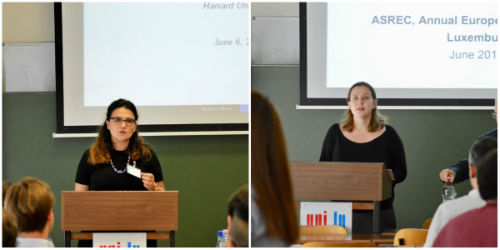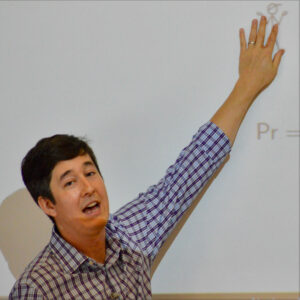The 2018 edition of the Association for the Study of Religion, Economics and Culture’s (ASREC) annual workshop in Europe was hosted by the Centre for Research in Economics and Management at Uni.lu from 6 to 8 June.
ASREC, headquartered at Chapman University, USA, promotes interdisciplinary scholarship on religion, economics and culture through conferences, workshops, newsletters, websites, working papers, teaching, and research. The ASREC Europe 2018 workshop was organised locally by Associate Prof. Skerdilajda Zanaj, Dr Anastasia Litina, former CREA postdoctoral researcher and now lecturer at the University of Ioannina, Greece and Prof. Andreas Irmen.
Approximately 40 scholars from around the world participated in the workshop presenting papers from across the social sciences. The programme also featured two outstanding keynote speakers: Prof. Nathan Nunn, Harvard University, and Prof. Luigi Guiso, Einaudi Institute for Economics and Finance (EIEF). The IMF lists Prof. Nunn among the 25 economists under the age of 45 who are shaping the way we think about the economy. Prof. Guiso is a world-leading economist in culture and economics, macroeconomics and finance.
The talk by Prof. Nunn argued about the deep roots of why religion exists and why it matters in economics. Prof. Guiso’s speech concentrated on the demand for populism, by analysing the drivers of the populist votes, and on the supply for populism, finding that populist parties are more likely to appear when the drivers of demand for populism accumulate.
The main theme of the workshop was economics of religion, a subfield of cultural economics. Among the topics explored, for example, was the effect of Albania’s ban on religious practice in 1967 on the country’s economic growth (Prof. Shqiponja Telhaj, University of Sussex). Prof. Marek Endrich (Hamburg University) analysed the impact on human rights in a country before and after the visit of the Pope whereas Prof. Manuel Santos Silva (Göttingen University) traced back the roots of female emancipation in northwestern European countries to the presence of cold water in this geographical area. Prof. Naci Mocan (Lousiana University) empirically investigated whether the superstition that children born in the dragon years of the Chinese horoscope grow up to be more successful is a self-fulfilling prophecy, finding that such a superstition persist in time only because parents of so-called “dragon children” invest more in these children. Many other interesting papers were presented, for example on witch trials and gender differences in trust or the transit from animistic to more hierarchal religions.
The workshop was funded by CREA with financial support of the Robert Schuman Institute at the University of Luxembourg. The organisers would like to thank all particiants and guests as well as the local administration involved in hosting this high-profile event.

